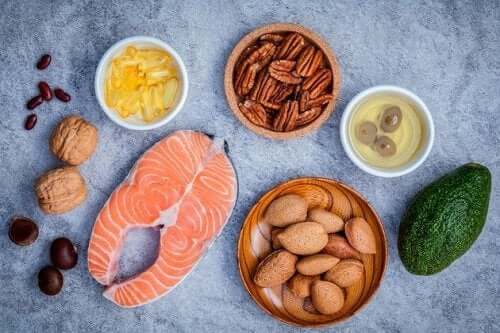6 Reasons Your Weight-Loss Diets Keep Failing


Written and verified by the nutritionist Eliana Delgado Villanueva
According to a survey from SEEDO (Spanish Society for the Study of Obesity), 81% of Spaniards fail in their diets. To lose weight, you have to identify the obstacles that keep you from following a diet and look for solutions. Because of that, we want to analyze the possible reasons why your weight-loss diets keep failing.
Keep reading to find out the top 6 reasons.
Why do your weight-loss diets keep failing?
If you’re following a diet right now, you might have asked yourself this question. One study indicates that two out of three people who diet not only gain back the lost weight, but actually gain more weight than what they had at the start of the diet.
As a result, you get frustration and a vicious cycle that makes the scale a roller coaster, with its corresponding negative effects, both for your metabolism and your mood.
Read also: What Do Successful Diets Have in Common?
6 reasons why your weight-loss diets keep failing
1. You stop eating essential healthy fats

This could be the main reason your weight-loss diets keep failing. Some health professionals suggest that an imbalance in your consumption of omega-3 and omega-6 fatty acids can be related to obesity.
Ideally, you should consume about the same amount of omega-6 and omega-3. But due largely to a high consumption of processed foods, which often contain vegetable oils and other fats, many people’s consumption of omega-6 fatty acids is too high compared to their omega-3 intake.
Additionally, if you stop eating foods that are high in omega-3 fatty acids, it can cause you to overeat because your body isn’t receiving all the nutrients it needs and you crave fats of any kind, which can lead to binge eating.
2. There’s a calorie deficiency
Since your body works to maintain its weight, when it doesn’t get enough food, you stay hungry and nutrient-deprived. When this happens consistently, it triggers a survival response in which the body slows down your metabolism to save resources.
Your body intelligently monitors its calorie output, because it doesn’t know when it will have access to the nutrients it needs. This is what keeps us alive in times of hunger.
So, paradoxically, not having enough calories can actually make your body gain weight because your metabolism slows down to go into “survival mode”.
3. There’s a protein deficiency

Many people look at legumes, for example, as a high calorie food group that should be avoided if you want to lose weight.
However, the truth is that these foods are also a source of slow absorbing carbohydrates that keep you full for many hours. Additionally, since they are high in protein and help to develop muscle mass, they also help to burn fat.
4. You do too much exercise
Doing regular exercise is very important, but 30 minutes of moderate physical activity daily is enough. On the other hand, if you do exercise too intensely, you’ll set off your body’s stress response.
Doing this repeatedly can put your body in a state of chronic stress. When this happens, your immune system slows down and your body releases cortisol, the stress hormone, which can contribute to weight gain. It’s also associated with immune problems, depression, and infertility.
5. Because of the stress from your diet

Excessive exercise isn’t the only aspect of weight loss that can trigger your body’s stress response. Constantly worrying about what you eat, counting calories, and losing the pleasure of eating can also stress your body.
Instead of trying to adjust your lifestyle to the strict rules of a diet, just try to eat healthy food that satisfies your palate.
You might be interested in: Is It Dangerous To Lose Weight Too Quickly?
6. Your weight-loss diet fails because it’s unsustainable
Weight-loss diets have demanding rules, which makes them hard to maintain over the long term. Sooner or later you have to learn to eat healthily.
Instead of losing a lot of time tricking your body at the expense of your nervous system and health, you can work with your body’s natural functions.
You can give your body a constant flow of delicious food so that it can give you energy and vitality. Keeping a constant flow of nutrients keeps your blood sugar stable, allows you to concentrate, and gives you mental clarity.
Additionally, if you learn to eat healthily without dying from hunger, you’ll make smarter and more conscious decisions about what foods to eat and not eat and in what amounts.
These have been 6 reasons why your weight-loss diets keep failing. Now you know, try to apply them so you can reach your goals. Don’t give up!
All cited sources were thoroughly reviewed by our team to ensure their quality, reliability, currency, and validity. The bibliography of this article was considered reliable and of academic or scientific accuracy.
- Mann T, Tomiyama AJ, Westling E, Lew AM, Samuels B, Chatman J. Medicare’s search for effective obesity treatments: diets are not the answer. Am Psychol. 2007 Apr;62(3):220-33. Review. PubMed PMID: 17469900.
- Rynders CA, Thomas EA, Zaman A, Pan Z, Catenacci VA, Melanson EL. Effectiveness of Intermittent Fasting and Time-Restricted Feeding Compared to Continuous Energy Restriction for Weight Loss. Nutrients. 2019 Oct 14;11(10):2442
- Rajan TM, Menon V. Psychiatric disorders and obesity: A review of association studies. J Postgrad Med. 2017 Jul-Sep;63(3):182-190.
This text is provided for informational purposes only and does not replace consultation with a professional. If in doubt, consult your specialist.








